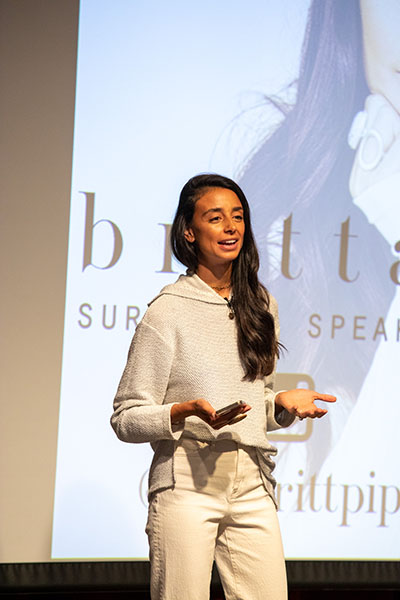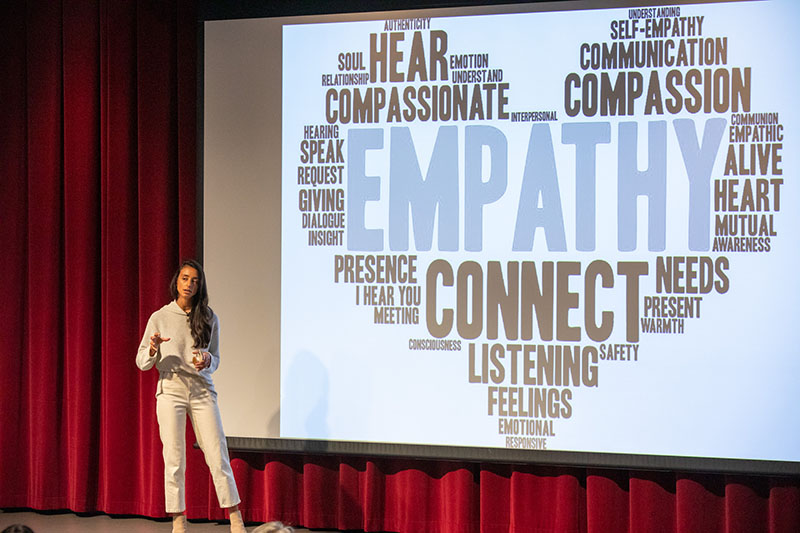- Apply
- Visit
- Request Info
- Give
Sexual assault survivor deconstructs rape culture
Written by Molly Boucher
Published on October 12, 2021

The Women's Center at Eastern Connecticut State University in collaboration with the Sexual Assault and Interpersonal Violence Response Team (SAIVRT) hosted “Rape Culture: A Survivor Perspective” by Brittany Piper on Oct. 5. Piper, who is a survivor of sexual assault, has dedicated her life to spreading the message of rape prevention. Working as an international activist, speaker, social justice photographer, and healing and wellness coach, she spent an hour talking to the Eastern community about rape culture and how to deconstruct it.
“We are honored to have the support of the advocates from the sexual assault crisis center who are here with us to share information and provide support to victims, survivors and those in need,” said graduate intern Jessica Petry as she welcomed Piper to the stage.
“This conversation is difficult,” said Piper, “It’s uncomfortable.” The topics she focused on included rape, rape culture, consent, sympathy vs. empathy and prevention.
She began her presentation by asking audience members questions that made them realize how frequent sexual violence happens. “Research would show that one out of the four women that you just looked at has already experienced some form of sexual violence,” Piper told the crowd. “And one out of the six men that you just looked at has already experienced some form of sexual violence.”
Piper continued with a discussion on the difference between empathy and sympathy. “How did I get to a place where I had become so blind and so desensitized to this going on all around me? I believe it’s because I got to a place where I lacked empathy for survivors and unfortunately that’s were a lot of the world is,” said Piper. She then shifted her focus to the term consent. “It’s continuous, it’s revocable and it is absolutely mandatory.”
Tackling the term “rape culture,” Piper first discussed the definitions of rape and the meaning of consent. Giving the audience a number of tips and advice, Piper explained consent was more than physical experiences within social settings, saying, “It’s also about respecting people’s boundaries.” After addressing the first half of the term “rape culture,” she took on the second--culture.
As Piper described culture, “it is the characteristics and knowledge of a particular group of people,” and it is expressed through “language, social habits, arts, music, media and so much more.”
“It’s constructed, meaning it can be deconstructed.” The stories that carry on culture are significant, as people are more likely to remember them than facts and statistics, she explained. “Stories stick with us forever.” 
She then went on to tell the story of a rape case at Stanford University, one that captivated the country. Piper explained that this case was one of the first cases in which the story was told from the perspective of the survivor. The event and the story that was told compelled people to protest. She followed this point by asking the audience how culture and subsequent stories incite sexual violence.
“When we dehumanize the act of sex, of course we lack empathy.” Piper showed a number of advertisements that added sexualization to marketing. Companies such as Burger King, Abercombie and Fitch and many others use sexualized bodies to sell their products. She expressed the same issues with television shows, video games and lyrics in music.
Piper, who is a survivor herself, shared her own story with the audience. Starting by showing a newsclip about a survivor of a violent assault, she asked the audience to share their thoughts on the report. In the clip, the survivor is described as “stoic” and “strong” while facing her attacker and rapist in court. Unknown to the audience, Piper was the survivor in the clip, and revealed to the audience that while that was how she showed herself on the outside, she was struggling internally.
She shared intimate details of her attack, including the aftermath, using how her two friends handled it as another example of sympathy and empathy. “Sympathy says ‘I’m sorry that happened to you, that’s life. Let's talk in the morning.’ Empathy says ‘I’m sorry that happened to you. How can I physically and literally help you carry this pain?’ The way we respond when someone discloses to us can change the trajectory of someone’s entire recovery.”
Piper went on to say that “sexual assault is one of the only crimes where the survivor has to prove they were in fact the victim of that crime.” It was through this point that she pressed being more trauma-informed as a society. “Your body takes over,” she explained, continuing the presentation through the lenses of fight or flight. “Research shows that over 70 percent of survivors experience freeze, or tonic immobility, when they experience sexual assault.” She explained that the brain shuts down to prevent them from remembering traumatic events.
Piper closed her presentation by saying that those who serve as allies hold the responsibility of believing survivors. She stated that those who survivors confide in are the first line of defense, and in turn, can have a vast impact on their recovery.
She provided tips on how to interact with a survivor when hearing their story, including stopping yourself from taking control of the situation; allowing survivors to act and respond however they want; giving them your undivided attention; encouraging them to keep talking; offering further support; containing your emotions and lastly “forgetting the soapbox.” It is not the job of an ally to solve the problem, Piper explained. “When someone tells you they’ve experienced sexual assault, it’s your job to say, ‘I believe you.’”
For more resources regarding sexual violence, visit the Sexual Assault and Interpersonal Violence Response Team website at https://www.easternct.edu/equity-and-diversity/resources.html

